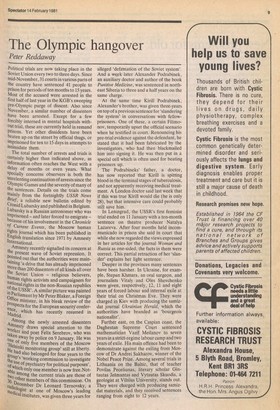The Olympic hangover
Peter Reddaway
Political trials are now taking place in the Soviet Union every two to three days. Since mid-November, 31 courts in various parts of the country have sentenced 41 people to Prison for periods of ten months to 15 years. Most of the accused were arrested in the first half of last year in the KGB's sweeping Pre-Olympic purge of dissent. Also since November, a similar number of dissenters have been arrested. Except for a few forcibly interned in mental hospitals without trial, these are currently held in remand prisons. Yet other dissidents have been beaten up on the street by official thugs, or imprisoned for ten to 15 days in attempts to intimidate them.
The total number of arrests and trials is certainly higher than indicated above, as information often reaches the West with a delay of months or even years. What Specially concerns observers is both the unrelenting continuation of arrests since the Olympic Games and the severity of many of the sentences. Details on the trials come mainly from the fortnightly USSR News Brief, a reliable new bulletin edited by Cronid Lubarsky and published in Belgium. Lubarsky is a Russian astronomer who was imprisoned — and later forced to emigrate — because of his involvement in the Chronicle of Current Events, the Moscow human tights journal which has been published in English translation since 1971 by Amnesty International. Amnesty recently signalled its concern at the present wave of Soviet repression. It Pointed out,that the authorities were maintaining 'a drive that has already imprisoned more than 200 dissenters of all kinds all over t,he Soviet Union — religious believers, ilaMan rights activists and campaigners for national rights in the non-Russian republics f the USSR'. A similar picture was painted 1,,I1Earliament by Mr Peter Blaker, a Foreign """Ice minister, in his bleak review of the prospects for the European security conference, which has recently resumed in Madrid. A AMong the newly arrested dissenters iunnesty draws special attention to the :tworker and poet Felix Serebrov, who was ken away by police on 9 January. He was ,,Ite of only five members of the Moscow Helsinki monitoring group' still at liberty. gro He had also belonged for four years to the
P
the s working commission to investigate use of psychiatry for political purposes', aobf.i which only one member is now free.Nottwe among the current trials are those of .„0 other members of this commission. On r'audPecember Dr Leonard Ternovsky, a nlecil°.1°gist at one of Moscow's leading leal institutes, was given three years for alleged 'defamation of the Soviet system'. And a week later Alexander Podrabinek, an auxiliary doctor and author of the book Punitive Medicine, was sentenced in northeast Siberia to three and a half years on the same charge.
At the same time Kirill Podrabinek, Alexander's brother, was given three.years on top of a previous sentence for 'slandering the system' in conversations with fellowprisoners. One of these, a certain Filimonov, temporarily upset the official scenario when he testified in court. Renouncing his pre-trial evidence against the defendant, he stated that it had been fabricated by the investigators, who had then blackmailed him into signing it. He was then put in a special cell which is often used for beating prisoners up.
The Podrabineks' father, a doctor, has now reported that Kirill is spitting blood in the terminal stages of tuberculosis, and not apparently receiving tnedical treatment. A London doctor said last week that if this was true Kirill would die (he is only 28), but that intensive care could probably still save him.
In Leningrad, the USSR's first feminist trial ended on 11 January with a ten-month sentence on theatre producer Natalya Lazareva. After four months held incommunicado in prison she said in court that while she now regarded the views expressed in her articles for the journal Woman and Russia as one-sided, the facts in them were correct. This partial retraction of her `slander' explains her light sentence.
Deeper in the provinces many sentences have been harsher. In Ukraine, for example, Stepan Khmara, an oral surgeon, and journalists Vitaly and Oles Shevchenko were given, respectively, 12, 11 and eight years of forced labour and internal exile at their trial on Christmas Eve. They were charged in Kiev with producing the samizdat journal Ukrainian Herald, which the authorities have branded as 'bourgeois nationalist'.
Further east, on the Caspian coast, the Daghestan Supreme Court sentenced mathematician Vazif Meilanov to seven years in a strict-regime labour camp and two years of exile. His main offence had been to demonstrate against the exiling from Moscow of Dr Andrei Sakharov, winner of the Nobel Peace Prize. Among several trials in Lithuania on the Baltic, that of teacher Povilas Peceliunas, literary scholar Gintautas Jegmantas and Vytautas Skuodis, a geologist at Vilnius University, stands out. They were charged with producing samizdat materials, and they received sentences ranging from eight to 12 years.






































 Previous page
Previous page